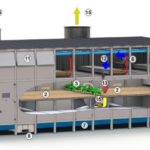Unleashing Efficiency: The Role of Fuel Catalysts in Combustion Optimization
Understanding Fuel Catalysts
 In the quest for cleaner and more efficient energy utilization, researchers and engineers have turned their attention to innovative solutions, and one promising avenue is the use of fuel catalysts. These substances are designed to enhance combustion processes, ultimately leading to improved fuel efficiency, reduced emissions, and enhanced engine performance. In this article, we’ll explore the principles behind fuel catalysts, their applications, and the potential benefits they offer in the realm of transportation and industry.
In the quest for cleaner and more efficient energy utilization, researchers and engineers have turned their attention to innovative solutions, and one promising avenue is the use of fuel catalysts. These substances are designed to enhance combustion processes, ultimately leading to improved fuel efficiency, reduced emissions, and enhanced engine performance. In this article, we’ll explore the principles behind fuel catalysts, their applications, and the potential benefits they offer in the realm of transportation and industry.
Fuel catalysts operate on the premise of modifying the chemical reactions involved in the combustion of fuels. Typically composed of metals or metal oxides, these catalysts are introduced in small quantities to the fuel, where they act as agents to facilitate more efficient and complete burning. By accelerating combustion, fuel catalysts aim to optimize energy release from the fuel, contributing to a cleaner and more economical operation.
How Fuel Catalysts Work
At their core, fuel catalysts work through several mechanisms to enhance combustion. One common mechanism involves the breaking down of hydrocarbon chains in the fuel, promoting better vaporization and subsequent combustion. This not only enhances fuel efficiency but also reduces the formation of harmful byproducts.
Another key aspect is the prevention of carbon deposits. Over time, engines can accumulate carbon deposits that hinder optimal combustion. Fuel catalysts help mitigate this by promoting a cleaner burn, minimizing the buildup of carbon residues, and subsequently extending the lifespan of engines.
Applications in Various Engines
Fuel catalysts find applications across a spectrum of engines, from automobiles and trucks to marine vessels and industrial equipment. In the automotive sector, users have reported benefits such as improved fuel mileage and reduced emissions. Similarly, in maritime and industrial settings, fuel catalysts aim to enhance combustion efficiency, thereby reducing environmental impact and operational costs.
Environmental Impact
One of the significant advantages of fuel catalysts lies in their potential to reduce harmful emissions. By promoting more complete combustion, these catalysts can contribute to lower levels of carbon monoxide, nitrogen oxides, and particulate matter released into the atmosphere. As global initiatives focus on mitigating climate change and improving air quality, the role of fuel catalysts becomes increasingly relevant in achieving these goals.
Considerations and Challenges
While fuel catalysts hold promise, it’s essential to recognize that their effectiveness can vary based on factors such as fuel type, engine design, and operating conditions. Rigorous testing and adherence to manufacturer recommendations are crucial to realizing the full potential of these catalysts. Moreover, ongoing research and development efforts aim to address challenges and optimize catalyst formulations for diverse applications.
Conclusion
Fuel catalysts represent a compelling frontier in the pursuit of cleaner and more efficient energy utilization. By fine-tuning combustion processes, these catalysts offer a pathway to reduced emissions, improved fuel efficiency, and enhanced engine performance. As technology advances and environmental considerations take center stage, the role of fuel catalysts is poised to grow, shaping the future of sustainable energy in transportation and industry.




